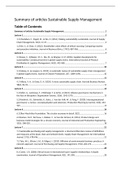Summary of articles Sustainable Supply Management
Table of Contents
Summary of articles Sustainable Supply Management......................................................................1
Lecture 1............................................................................................................................................3
1.1 Montabon, F., Pagell, M., & Wu, Z. (2016). Making sustainability sustainable. Journal of Supply
Chain Management, 52(2), 11-27.......................................................................................................3
1.2 Kim, S., & Chae, S. (2022). Shareholder value effects of ethical sourcing: Comparing reactive
and proactive initiatives. Journal of Business Ethics, 179(3), 887-906................................................6
Lecture 2............................................................................................................................................7
2.1 Busse, C., Schleper, M. C., Niu, M., & Wagner, S. M. (2016). Supplier development for
sustainability: Contextual barriers in global supply chains. International Journal of Physical
Distribution & Logistics Management, 46(5), 442-468.......................................................................7
Lecture 3..........................................................................................................................................10
3.1 Koberg, E., & Longoni, A. (2019). A systematic review of sustainable supply chain management
in global supply chains. Journal of Cleaner Production, 207, 1084-1098..........................................10
Lecture 4..........................................................................................................................................11
4.1 Villena, V. H., & Gioia, D. A. (2020). A more sustainable supply chain. Harvard Business Review,
98(2), 84-93......................................................................................................................................11
Lecture 5..........................................................................................................................................13
5.1 Keller, A., Lumineau, F., Mellewigt, T. & Ariño, A (2021). Alliance governance mechanisms in
the face of disruption. Organization Science, 32(6), 1542-1570.......................................................13
5.2 Roehrich, J.K., Selviaridis, K., Kalra, J., Van der Valk, W., & Fang, F. (2020). Interorganizational
governance: a review, conceptualisation and extension. Production Planning & Control, 31(6), 453-
469....................................................................................................................................................14
Lecture 6..........................................................................................................................................16
6.1 Ellen MacArthur Foundation. The circular economy in detail. 2022...........................................16
6.2 Bocken, N.M., De Pauw, I., Bakker, C., & Van der Grinten, B. (2016). Product design and
business model strategies for a circular economy. Journal of Industrial and Production Engineering,
33(5), 308-320..................................................................................................................................18
Lecture 7..........................................................................................................................................21
7.1 Sustainable purchasing and supply management: a structured literature review of definitions
and measures at the dyad, chain and network levels. Supply Chain Management: An International
Journal, 17(5), 478-496.....................................................................................................................21
7.2 Tate, W.L., Ellram, L.M., & Gölgeci, I. (2013). Diffusion of environmental business practices: A
network approach. Journal of Purchasing and Supply Management, 19(4), 264-275......................24
Lecture 8..........................................................................................................................................28
8.1 Carter, C.R. (2000). Ethical issues in international buyer-supplier relationships: A dyadic
examination. Journal of Operations Management, 8(2), 191-208....................................................28
, 8.2 Tate, W.L., Ellram, L.M., & Dooley, K.J. (2012). Environmental purchasing and supplier
management (EPSM): Theory and practice. Journal of Purchasing and Supply Management, 18(3),
173-188............................................................................................................................................29
Lecture 9..........................................................................................................................................31
9.1 Dong, L. (2021). Toward resilient agriculture value chains: Challenges and opportunities.
Production and Operations Management, 30(3), 666-675...............................................................31
Lecture 10........................................................................................................................................33
10.1 Lee, H. L. (2004). The triple-A supply chain. Harvard Business Review, 82(10), 102-113..........33
10.2 De Vries, H., Jahre, M., Selviaridis, K., van Oorschot, K. E., & Van Wassenhove, L. N. (2021).
Short of drugs? Call upon operations and supply chain management. International Journal of
Operations & Production Management, 41(10), 1569-1578............................................................34
,Lecture 1
Supply management and supply chain sustainability
1.1 Montabon, F., Pagell, M., & Wu, Z. (2016). Making
sustainability sustainable. Journal of Supply Chain
Management, 52(2), 11-27.
"Making Sustainability Sustainable" by F. Montabon, M. Pagell, and Z. Wu, published in the Journal of
Supply Chain Management in 2016, is an article that focuses on the challenges of making
sustainability a sustainable part of supply chain management.
The authors argue that while sustainability has become a popular concept in supply chain
management, it has not yet been fully integrated into the practices of organizations. They suggest
that this is because sustainability is often seen as an additional responsibility, rather than an integral
part of supply chain management
Table 1, comparison of current sustainability and ecologically dominant logics, adopted from Montabon et al. (2016)
, Table 2, stakeholder roles under instrumental and proposed logics, adopted from Montabon et al. (2016)
The authors present a framework for making sustainability a sustainable part of supply chain
management. The framework consists of four components: (1) aligning sustainability with
organizational goals and values, (2) integrating sustainability into decision-making processes, (3)
embedding sustainability into organizational structures and processes, and (4) continuously
monitoring and improving sustainability practices.
1. The authors argue that aligning sustainability with organizational goals and values is crucial
for ensuring that sustainability becomes a sustainable part of supply chain management. This
requires that organizations view sustainability as a long-term investment, rather than a
short-term cost.
2. Integrating sustainability into decision-making processes is also important for making
sustainability a sustainable part of supply chain management. The authors suggest that this
can be achieved by incorporating sustainability considerations into decision-making criteria
and by engaging in stakeholder consultation.
3. Embedding sustainability into organizational structures and processes is essential for
ensuring that sustainability practices are sustained over time. The authors argue that this can
be achieved by incorporating sustainability into performance measurement and
management systems and by creating a culture that values sustainability.
4. Finally, the authors argue that continuously monitoring and improving sustainability practices
is critical for ensuring that sustainability remains a sustainable part of supply chain
management. This requires that organizations regularly assess their sustainability practices
and identify opportunities for improvement.




